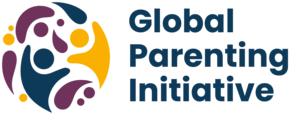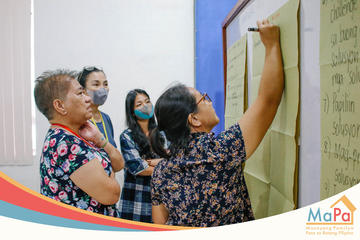The PLH Philippines team is working hard to build the capacity of partner organisations to deliver MaPa programmes. The team met the Joy Nostalg Foundation (JNF) on 11 July to review a potential second collaboration to train MaPa facilitators and implement the programme in an additional site. A monitoring and evaluation workshop was also conducted alongside Ateneo de Manila University (AdM) on 13 August. The workshop aimed to enable the JNF to monitor and support effective evidence generation for their programme implementation. In addition, the second series of MaPaChat hybrid facilitator training was conducted with 22 participants in partnership with Makati City Social Welfare Development (15-19 July). Preparations are also ongoing for a five-day MaPa comprehensive training in partnership with nine NGOs and a local government unit in Naga City, to commence from October.
With regards to programme scaling progress, integration of MaPa modules in year two of the Department of Social Welfare and Development’s (DSWD) 7-Year Transformative Learning Path is ongoing and includes sessions 5 (“using consequences in parenting”) and 10 (“solving problems as a family”). Dr Liane Alampay (Co-Principal Investigator) also shared a proposed work plan with the DSWD Secretary for an update to the Family Development Sessions. The PLH PH team is coordinating with the GPI and PLH charity to explore potential support options for implementing this initiative. In addition, the PLH PH team participated in the modules development workshop for the Centers and Residential Care Facilities held at DSWD Central Office on 8 July. Capacity sharing activities include Dr Alampay’s participation as a panellist at a GPI Webinar on Research Inequalities in the Global South on 23 July. The webinar served as a dialogue on how to address disparities and share experiences in North-South research collaborations. In addition, Dr Bernice Mamauag (MaPa Research Director) presented on the cultural adaptation of PLH for Young Children in the Philippines during a GPI Future Leader’s Journal Club session on 27 August.
With regards to research implementation, the team received ethical approval from AdM for a project to gather information from adolescents, teenage parents, caregivers, and community service providers on the inclusion of adolescent sexual reproductive health content within the MaPa Teens programme. Data gathering is scheduled for August for Angeles City, Pampanga and Cagayan de Oro City. The team is also preparing for three-month follow up data collection for the MaPa Teens RCT in Sta Maria, Bulacan in September. Concerning advocacy progress, a MaPa brief was submitted to the Valenzuela City Social Welfare Office for the programme’s continuity in the city.
On 5 August, Jennel Reyes (Co-Principal Investigator) also presented the MaPa programme during the first National Preparatory Session in the Philippines for the Global Ministerial Conference on ending violence against children.
In terms of innovation, The PLH-MaPa team has initiated preparations for the enhancement of the MaPa Kids programme and has also revised and created the MaPa Hybrid Handbook. Finally, the team welcomed a new Project Assistant, Maria Eloisa Beatrice Encinas, to support the remaining deliverables and activities.





